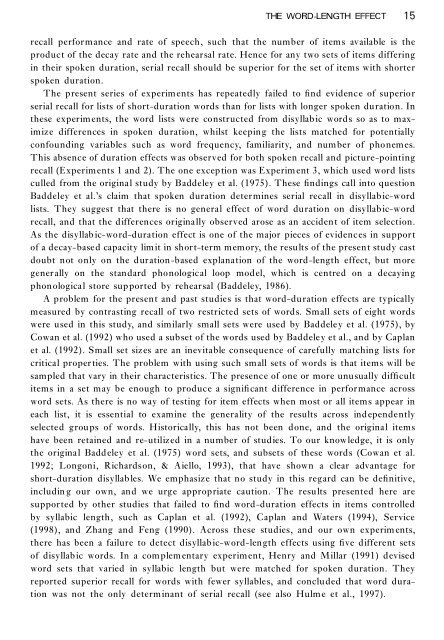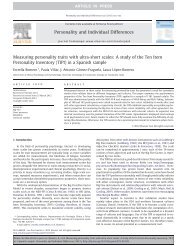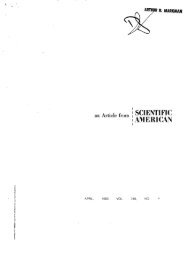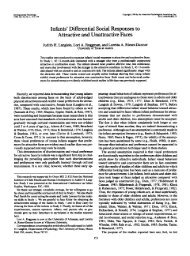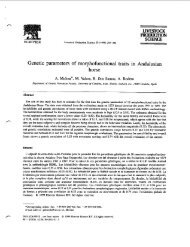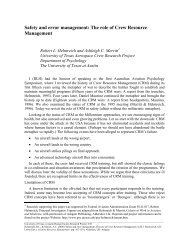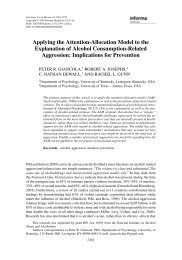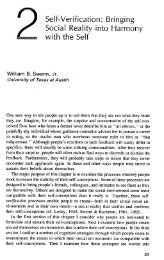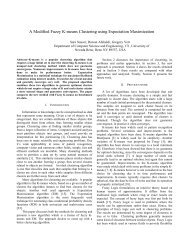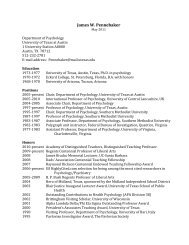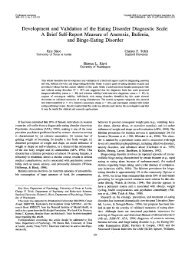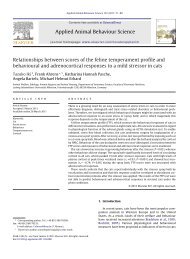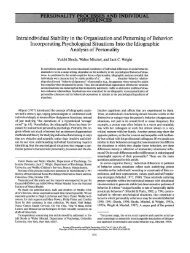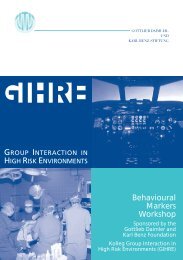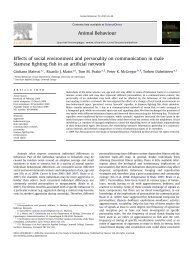The Word-Length Effect and Disyllabic Words (Lovatt
The Word-Length Effect and Disyllabic Words (Lovatt
The Word-Length Effect and Disyllabic Words (Lovatt
You also want an ePaper? Increase the reach of your titles
YUMPU automatically turns print PDFs into web optimized ePapers that Google loves.
THE WORD-LENGTH EFFECT 15<br />
recall performance <strong>and</strong> rate of speech, such that the number of items available is the<br />
product of the decay rate <strong>and</strong> the rehearsal rate. Hence for any two sets of items differing<br />
in their spoken duration, serial recall should be superior for the set of items with shorter<br />
spoken duration.<br />
<strong>The</strong> present series of experiments has repeatedly failed to ®nd evidence of superior<br />
serial recall for lists of short-duration words than for lists with longer spoken duration. In<br />
these experiments, the word lists were constructed from disyllabic words so as to maximize<br />
differences in spoken duration, whilst keeping the lists matched for potentially<br />
confounding variables such as word frequency, familiarity, <strong>and</strong> number of phonemes.<br />
This absence of duration effects was observed for both spoken recall <strong>and</strong> picture-pointing<br />
recall (Experiments 1 <strong>and</strong> 2). <strong>The</strong> one exception was Experim ent 3, which used word lists<br />
culled from the original study by Baddeley et al. (1975). <strong>The</strong>se ®ndings call into question<br />
Baddeley et al.’s claim that spoken duration determines serial recall in disyllabic-word<br />
lists. <strong>The</strong>y suggest that there is no general effect of word duration on disyllabic-word<br />
recall, <strong>and</strong> that the differences originally observed arose as an accident of item selection.<br />
As the disyllab ic-word-duration effect is one of the major pieces of evidences in support<br />
of a decay-based capacity lim it in short-term memory, the results of the present study cast<br />
doubt not only on the duration-based explanation of the word-length effect, but more<br />
generally on the st<strong>and</strong>ard phonological loop model, which is centred on a decaying<br />
phonological store supported by rehearsal (Baddeley, 1986).<br />
A problem for the present <strong>and</strong> past studies is that word-duration effects are typically<br />
measured by contrasting recall of two restricted sets of words. Small sets of eight words<br />
were used in this study, <strong>and</strong> similarly small sets were used by Baddeley et al. (1975), by<br />
Cowan et al. (1992) who used a subset of the words used by Baddeley et al., <strong>and</strong> by Caplan<br />
et al. (1992). Small set sizes are an inevitable consequence of carefully matching lists for<br />
critical properties. <strong>The</strong> problem with using such small sets of words is that items will be<br />
sampled that vary in their characteristics. <strong>The</strong> presence of one or more unusually dif®cult<br />
items in a set may be enough to produce a signi®cant difference in performance across<br />
word sets. As there is no way of testing for item effects when most or all items appear in<br />
each list, it is essential to examine the generality of the results across independently<br />
selected groups of words. Historically, this has not been done, <strong>and</strong> the original items<br />
have been retained <strong>and</strong> re-utilized in a number of studies. To our knowledge, it is only<br />
the original Baddeley et al. (1975) word sets, <strong>and</strong> subsets of these words (Cowan et al.<br />
1992; Longoni, Richardson, & Aiello, 1993), that have shown a clear advantage for<br />
short-duration disyllables. We emphasize that no study in this regard can be de®nitive,<br />
includin g our own, <strong>and</strong> we urge appropriate caution. <strong>The</strong> results presented here are<br />
supported by other studies that failed to ®nd word-duration effects in items controlled<br />
by syllabic length, such as Caplan et al. (1992), Caplan <strong>and</strong> Waters (1994), Service<br />
(1998), <strong>and</strong> Zhang <strong>and</strong> Feng (1990). Across these studies, <strong>and</strong> our own experim ents,<br />
there has been a failure to detect disyllabic-word-length effects using ®ve different sets<br />
of disyllabic words. In a complementary experiment, Henry <strong>and</strong> Millar (1991) devised<br />
word sets that varied in syllabic length but were matched for spoken duration. <strong>The</strong>y<br />
reported superior recall for words with fewer syllables, <strong>and</strong> concluded that word duration<br />
was not the only determinant of serial recall (see also Hulme et al., 1997).


